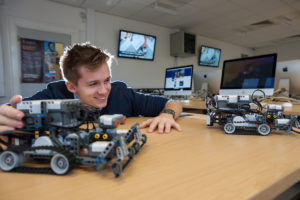How you'll learn
Teaching on the first year of this programme comprises formal lectures, small group tutorials and practical sessions in computer laboratories. You will also take part in one or more group projects. In your second year, you’ll undertake an industrial project in a real-world environment.
How you're assessed
Modules in the first year of the course are assessed through a combination of examinations and coursework. The examinations take place at the end of each semester and typically take the form of an in-person written assignment, usually to be completed in a couple of hours. You’ll be assigned coursework across the length of each semester. This typically takes the form of class tests, programming assignments or small projects.
The second year of the course is assessed through a portfolio of evidence from your industrial placement and a major project undertaken in your placement setting.
Liverpool Hallmarks
We have a distinctive approach to education, the Liverpool Curriculum Framework, which focuses on research-connected teaching, active learning, and authentic assessment to ensure our students graduate as digitally fluent and confident global citizens.
The Liverpool Curriculum framework sets out our distinctive approach to education. Our teaching staff support our students to develop academic knowledge, skills, and understanding alongside our graduate attributes:
- Digital fluency
- Confidence
- Global citizenship
Our curriculum is characterised by the three Liverpool Hallmarks:
- Research-connected teaching
- Active learning
- Authentic assessment
All this is underpinned by our core value of inclusivity and commitment to providing a curriculum that is accessible to all students.









